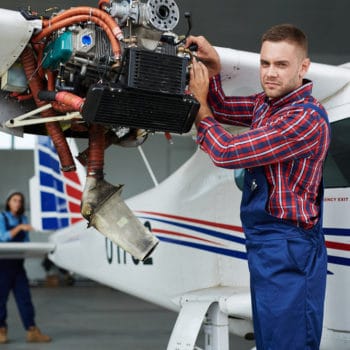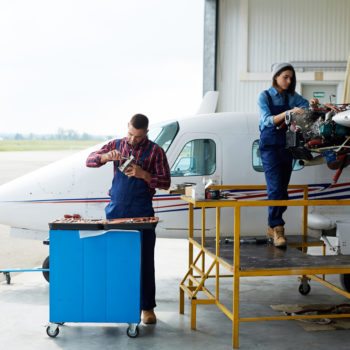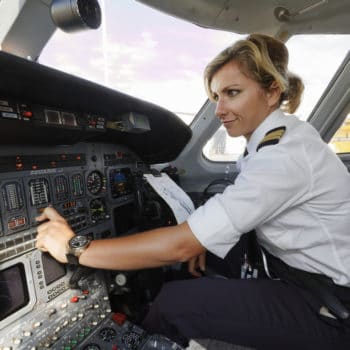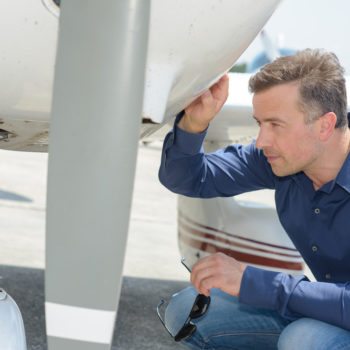Why We Love It
-
$60,200Potential Avg. Salary*
-
Growing DemandJob Outlook
* Salary & growth data is based on the recent Bureau of Labor and Statistics data published at https://www.bls.gov/oes/current/oes492091.htm for 49-2091 Avionics technicians 11/2021. Based on national data, not school-specific information. Conditions in your area may vary.
Whether you want to fly, build, repair, or direct planes for a living, a bachelor of science in aviation science or aeronautics may be right for you.
Students in aeronautics programs study every aspect of flight travel—from how to fly a plane to how to build one, how to maintain an aircraft to how to run an airport. If you’re interested in aviation and love aircraft, this degree may lead to your dream job.
What is a Degree in Aviation Science or Aeronautics?
There’s much more to the field of aviation science and aeronautics than just flying planes. While aircraft pilots get the most publicity, many other individuals work hard to get and keep planes in the air.
In an aeronautics program, you can learn about the other careers in aviation, choose the one that interests you the most, focus your studies on that area, and move into an exciting new career in the aviation and travel industry. Common focus areas include engineering, maintenance, dispatch, and air traffic control.
Some individuals in an aviation science program enroll after earning their pilot’s license, and others earn their license as part of their degree. All aviation students study some core courses in airline travel, such as flight safety, operations, dispatch, and maintenance. Graduates may find work in a variety of careers.
Some enter the Air Force to gain additional knowledge and training, some become commercial airline pilots, some buy planes and sell charter jet flights, and some keep planes flying as aircraft mechanics.
Recommended Schools
What Courses Would I Take For a Major in Aviation Science or Aeronautics?
- Aeronautical Science
- Aviation Legislation
- Aerodynamics
- Aircraft Performance and Weather
- Aviation Management
- Airport Security
- Aviation Regulations
- Private Pilot Fundamentals
What Jobs Can You Get with a Degree in Aviation Science or Aeronautics?
Boeing—one of the world’s largest manufacturers of aircraft—predicts that there will be more than 500,000 new jobs for pilots and more than 600,000 new jobs for aircraft mechanics by the year 2034.
As more businesses expand globally and more retailers seek to sell and ship their goods all over the world, more individuals and cargo will need to be shipped via plane travel. Graduates should be able to find work in airports or as pilots, engineers, administrators, or aircraft engineers for a variety of companies.
How Long does it take?
A bachelors in Aviation Science or Aeronautics will have a typical length of 4 years in a full time schedule. That said, there are many ways to speed up the timeframe by either taking more units via online coursework, community college, or taking free classes at OnlineDegree.com that could transfer to universities in the US.
Online Aviation Science or Aeronautics Degree
Online aviation programs does not offer all the career opportunities compared to conventional learning. The most common programs offered online are aviation management and aviation maintenance.
Earning a bachelor degree requires completing around 120 credit hours. There are also few master’s degree programs offered online in aviation management which can be completed entirely online.
What Can You Do With an Aviation Science or Aeronautics Degree?
Aviation has played a major role in shaping our current world since the first commercial flight started in 1914. People can travel easily within one day from China or Australia in the Far East to Canada or the United States in the far west of the world.
The International Air Transport Association announced that 4.1 billion passengers flew in 2017. It is also estimated that at any moment more than 500,000 passengers are flying between different cities. Aviation science is not limited to commercial flights but it is also important for military purposes.
Aviation scientists are responsible for developing more powerful aircraft and missiles that represent the main military force for most of countries. They also play a role in other fields including for example space exploration or developing drones for commercial purposes.
What does an aviation science student learn?
Aviation science prepares students to learn topics related to aviation from various views. Students learn the physical theories and phenomena related to flying and topics related to aviation management. In most programs, there is much focus on building practical experience through training programs.
The following list shows the courses common to aviation science programs:
- Aviation physics: this includes fluid dynamics, mechanics, electronics and static physics.
- Private and commercial pilot flight: this course introduces the principles and regulations related to the flights.
- Aviation safety: this is essential knowledge for aviation as safety constitutes a large part of the focus of aviation companies. Flight crashes can result in large numbers of deaths and financial losses that may cause the bankruptcy of companies.
- Meteorology: understanding the indicators for the weather forecast as rain, wind speed and direction is essential for the aviation field.
- Instrumentation: This course introduces the instruments used in aviation including planes or ground systems
- Air traffic control: this is a critical task in aviation that aims at avoiding air accidents at airports during landing and take-off.
- Maintenance of aircraft and related facilities.
- Dispatch and flight operations
- Communications
Now I have the aviation science degree…where can I work after graduating?
Studying aviation science provides a great deal of technical knowledge that is exciting for most students. Additionally, it opens chances for you to join various positions in the aviation industry which is considered one of the most advanced, well-organized and efficient industries.
Flying an airplane is not the only choice for your future career, although it is very attractive for many students. In general, careers related to aviation are highly rewarding. The following list shows the various career options for aviation science graduates:
- Cargo operations: cargo airplanes are becoming more important as companies as Amazon and FedEx are purchasing their own fleets.
- Charter operations: working for small companies operating charter flights and private jets can be an option for aviation graduates but salaries are normally lower compared to larger companies.
- Flight instructor: training aviation students
- Astronauts: some of the talented graduates can get the chance to join a space agency such as NASA either on the ground or in space.
- Air traffic control: they work to synchronize the flights to maintain the safest and highest flow of airplanes
- Airport and aviation companies management: having knowledge of aviation science is important for efficient management
- Maintenance of aircraft and other related equipment
Should I choose an aviation science degree?
The aviation industry is an exciting and intense choice for a career. Graduates develop a number of skills that are essential for their future:
- Team working skills: if you work in the aviation industry, you will always have to work within teams in an efficient and synchronized way.
- High performance under pressure: delaying a flight is not acceptable for any company as it means losing money. Working in aviation can be very stressful and you should be able to work well with these situations.
- Paying close attention to details: small mistakes can cause disasters in aviation
- Technical skills: ability to interpret data from various equipment in the plane or ground equipment
- Ability to stay focused for a long time: flights can extend for more than 20 hours.
- Confidence to make critical decisions that may be related to the lives of hundreds of people
- Problem-solving skills: aviation graduates should be able to analyze the available data and detect the problem without depending on support from others.
Recommended Schools
Best Jobs for Aviation Science or Aeronautics Degrees
With a degree in aviation science, you’ll have the education needed to succeed in a variety of careers. You may work as a pilot or aircraft mechanic for companies like Delta, Southwest, or UPS, or you may design and build aircraft for companies like Boeing or Airbus.
You may also work for the FAA as an air traffic controller, or you may work in airport security, management, or administration roles.
How to save time and money
Our mission is to help you to avoid paying full price for college. We want your Aviation Science or Aeronautics degree to be affordable and accessible. Here’s how you could save:
Create Your Free SmartPlan

There are many ways to make college affordable and accessible.
That’s why we created a helpful tool called SmartPlan.
It’s free, and helps you find potential ways to save and tons of information about each school you’re considering
Think of it as your “college blueprint”, to help you instantly craft a path to your degree:
- Which Colleges Match Your Needs
- Ways You Could Save Time & Money
- Free Courses You Could Take for Credit
- Valuable Data and Insights on Each College
- Detailed Steps You Should Take!
See what’s possible for you and generate a free plan within just a few minutes
Create My SmartPlanBecome an Aircraft Mechanic First
The only credential needed to work as an aircraft mechanic is an A&P license, and there are no educational requirements for taking the A&P exams. Students may be able to learn all they need to know to pass the A&P exams in a certificate or associate’s degree program in aircraft mechanics.
This will allow you to begin earning professional experience and an income sooner, and the credits may transfer if you decide to pursue a bachelor’s degree in aviation science or aeronautics later in life.
You Might also be Interested in
Many visitors who look for a degree in Aviation Science or Aeronautics are also interested in the following degrees.











